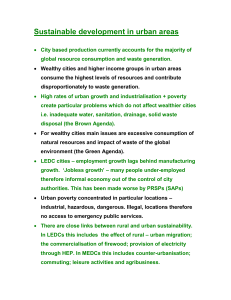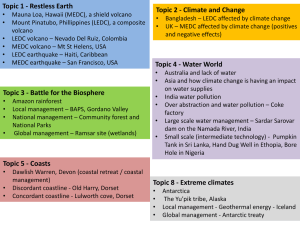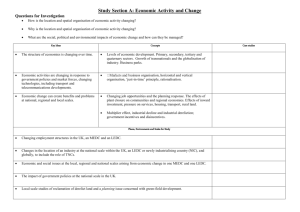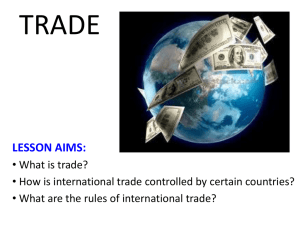Page of 3 ISSUE: 1 QUESTION OF: The effects of globalization on
advertisement
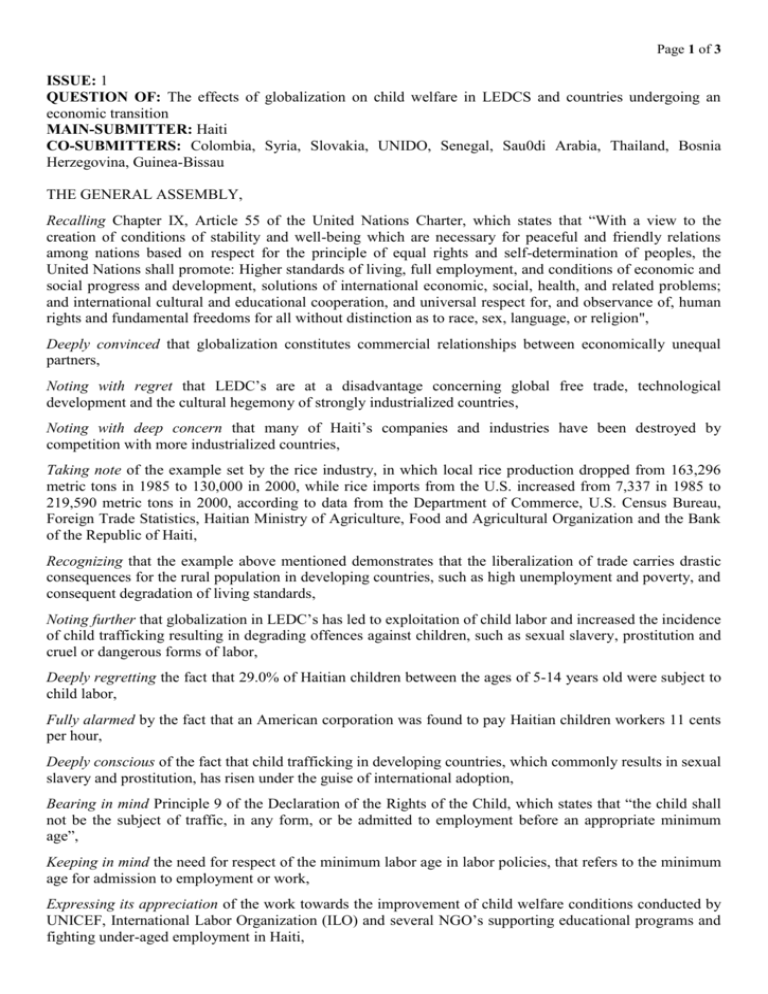
Page 1 of 3 ISSUE: 1 QUESTION OF: The effects of globalization on child welfare in LEDCS and countries undergoing an economic transition MAIN-SUBMITTER: Haiti CO-SUBMITTERS: Colombia, Syria, Slovakia, UNIDO, Senegal, Sau0di Arabia, Thailand, Bosnia Herzegovina, Guinea-Bissau THE GENERAL ASSEMBLY, Recalling Chapter IX, Article 55 of the United Nations Charter, which states that “With a view to the creation of conditions of stability and well-being which are necessary for peaceful and friendly relations among nations based on respect for the principle of equal rights and self-determination of peoples, the United Nations shall promote: Higher standards of living, full employment, and conditions of economic and social progress and development, solutions of international economic, social, health, and related problems; and international cultural and educational cooperation, and universal respect for, and observance of, human rights and fundamental freedoms for all without distinction as to race, sex, language, or religion", Deeply convinced that globalization constitutes commercial relationships between economically unequal partners, Noting with regret that LEDC’s are at a disadvantage concerning global free trade, technological development and the cultural hegemony of strongly industrialized countries, Noting with deep concern that many of Haiti’s companies and industries have been destroyed by competition with more industrialized countries, Taking note of the example set by the rice industry, in which local rice production dropped from 163,296 metric tons in 1985 to 130,000 in 2000, while rice imports from the U.S. increased from 7,337 in 1985 to 219,590 metric tons in 2000, according to data from the Department of Commerce, U.S. Census Bureau, Foreign Trade Statistics, Haitian Ministry of Agriculture, Food and Agricultural Organization and the Bank of the Republic of Haiti, Recognizing that the example above mentioned demonstrates that the liberalization of trade carries drastic consequences for the rural population in developing countries, such as high unemployment and poverty, and consequent degradation of living standards, Noting further that globalization in LEDC’s has led to exploitation of child labor and increased the incidence of child trafficking resulting in degrading offences against children, such as sexual slavery, prostitution and cruel or dangerous forms of labor, Deeply regretting the fact that 29.0% of Haitian children between the ages of 5-14 years old were subject to child labor, Fully alarmed by the fact that an American corporation was found to pay Haitian children workers 11 cents per hour, Deeply conscious of the fact that child trafficking in developing countries, which commonly results in sexual slavery and prostitution, has risen under the guise of international adoption, Bearing in mind Principle 9 of the Declaration of the Rights of the Child, which states that “the child shall not be the subject of traffic, in any form, or be admitted to employment before an appropriate minimum age”, Keeping in mind the need for respect of the minimum labor age in labor policies, that refers to the minimum age for admission to employment or work, Expressing its appreciation of the work towards the improvement of child welfare conditions conducted by UNICEF, International Labor Organization (ILO) and several NGO’s supporting educational programs and fighting under-aged employment in Haiti, Page 2 of 3 Emphasizing the overall negative impact of unregulated globalization in the economy of LEDC’s and countries undergoing economic transitions, and consequently in the lives of their populations, particularly in the lives of children, Guided by the work of organizations such as the United Nations Children's Fund (UNICEF), a United Nations Program that strives “to work with others to overcome the obstacles that poverty, violence, disease and discrimination place in a child’s path”, Contemplating the initiatives put forward by the International Labor Organization, a United Nations agency which “is devoted to promoting social justice and internationally recognized human and labor rights, pursuing its founding mission that labor peace is essential to prosperity”, 1. Calls upon all Member States to sign and ratify Convention No. 138 of 1973 on the Minimum Age, Convention No. 182 of 1999 on the Worst Forms of Child Labor from the International Labor Organization, the UNICEF Convention on the Rights of the Child and the UN Palermo Protocol on Trafficking in Persons; 2. Endorses the creation of stronger legislation in the World Trade Organization for preferential treatment of developing countries, which would include: a) The enforcing of progressive import quotas in order to protect developing industries, taking into account: i. GDP or other economic indicators for assessing national economies ii. Economic stability iii. Political stability iv. Economic disparity between the trading partners b) The transparent regulation of trade deals which seek to exploit economic fragility; 3. Requests the creation of the Child Support Fund for Developing Countries (CSFDC), a United Nations mandated organization specifically targeting LEDC’s and countries undergoing an economic transition, which would: a) Aid in the creation of educational opportunities international programs for children lacking said opportunities in their country of origin b) Provide financial aid to economically disadvantaged families in LEDC’s, decreasing the incidence of child labor as a way of family subsistence c) Aid already existing organizations such as UNICEF in providing health care and food aid in countries with higher rates of hunger and extreme poverty d) Have investigative jurisdiction over national and private corporations suspected of conducting illegal forms of child labor; 4. Recommends the institution of a stronger international agreement regarding transnational organized crime, without infringing national sovereignty, regarding: a) Extradition agreements b) Broader jurisdiction of international security forces c) Joint security taskforces between countries d) Effective coordination and border control in the capture of international criminals e) Allowing countries to appeal to the International Court of Justice in case of political asylum being given to individuals who have or have been: i. Proved to belong to international crime networks ii. Accused of serious offences in their country of origin iii. Accused of crimes against humanity; 5. Invites more economically developed Member States into signing and ratifying a new economic development program with LEDC’s, in which: Page 3 of 3 a) Economically developed Member States would provide support and improve development in LEDC’s by contributing with resource and technology advancements, and partnerships for the formation of professionals and higher education, in order to promote the specialization of labor in LEDC’s and foreign investment as a means of improving living standards and opportunities for the younger generations b) LEDC´s would comply to enforcing stricter regulation upon companies regarding the conditions of labor, in order to reduce the phenomenon of industrial delocalization, known to cause the rise of unemployment in developed countries and the exploitation of labor in LEDC’s; 6. Further calls upon the creation of legislation aiming to limit corporations’ unbalanced ability to: a) Move across borders without restriction b) Exploit natural resources c) Exploit human resources; 7. Draws the attention of Member States to the necessity of more efficient analysis of the neoliberal policies of institutions such as the International Monetary Fund, the World Trade Organization and the World Bank, and their impositions on developing countries; 8. Further reminds Member States of the necessity for international cooperation in regulating international adoption, in an effort to reduce worldwide trafficking, sexual slavery and prostitution of children; 9. Decides to remain actively seized upon this matter.
